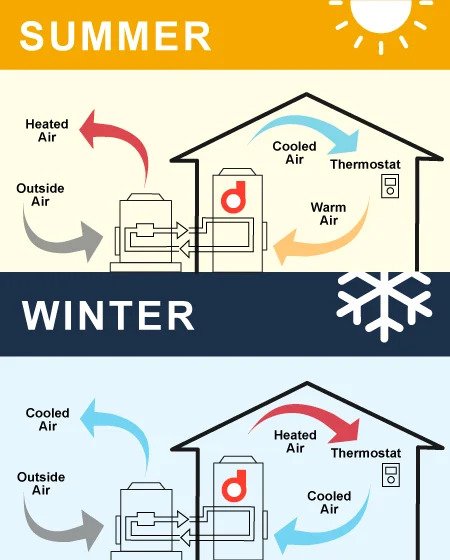The Nerd's Guide to Heat Pumps: Eco-Friendly Innovations Saving the Planet
Passionate about making a positive impact on the world? Subscribe to my newsletter and join the journey to a greener, brighter future today! 🌱🍋
In a world where environmental concerns are taking center stage, and technology continues to reshape our lives, one innovative solution stands out for its remarkable qualities. The humble heat pump, often regarded as a nerdy invention, is emerging as an eco-friendly hero. This unassuming system is not only environmentally responsible but also incredibly efficient, making it a top choice for those who care about both the planet and their pocketbooks. In this blog post, we'll dive into the amazing qualities of heat pumps that make them a perfect choice for the environmentally conscious. We'll also explore their origins and why you should have one in your home.
The Origin of Heat Pumps
The concept of heat pumps dates back to the 18th century when scientists like Lord Kelvin and Sadi Carnot explored the principles of thermodynamics. However, it was in the mid-20th century that heat pumps began to find practical applications in heating and cooling systems.
The heat pump's development gained momentum during World War II when it was used to maintain stable temperatures for delicate instruments. Over the years, technological advancements have refined and improved heat pump systems, making them more accessible, efficient, and reliable.
The Amazing Qualities of Heat Pumps
Now, let's explore the incredible qualities of heat pumps that are driving their popularity among environmentally conscious individuals:
Energy Efficiency: Heat pumps are like the overachievers of the HVAC world. These devices work by transferring heat from one place to another, rather than generating heat through combustion or electrical resistance. By doing so, they can provide both heating and cooling with remarkable efficiency. In fact, heat pumps can be up to three times more energy-efficient than traditional heating or cooling systems. This not only reduces your carbon footprint but also lowers your energy bills, making it a win-win for your wallet and the environment.
Diagram by Gilmore Building Company, Inc.
Versatility: Heat pumps are highly versatile. They come in various types, including air source, ground source (geothermal), and water source heat pumps. This means that they can be adapted to suit a wide range of environments, from suburban homes to urban apartments. Additionally, heat pumps can be used for space heating, water heating, and even pool heating. Their adaptability makes them a powerful tool in the fight against climate change.
Minimal Environmental Impact: Unlike fossil fuel-based heating systems, heat pumps produce zero emissions on-site. This is because they don't rely on the combustion of fossil fuels, which releases harmful greenhouse gases into the atmosphere. By using heat pumps, you can significantly reduce your carbon footprint and contribute to a cleaner, healthier planet. Additionally, heat pumps are a perfect match for renewable energy sources like solar panels, further reducing your environmental impact.
Longevity: Heat pumps are built to last. When well-maintained, they can have a lifespan of 15-20 years or more. This longevity reduces waste and the need for frequent replacements, making them a sustainable choice for your home. It's a true testament to their durability and reliability.
Quiet Operation: One of the less-discussed qualities of heat pumps is their quiet operation. Unlike noisy air conditioners or furnaces, heat pumps provide a comfortable indoor environment without disturbing your peace and quiet. This feature not only enhances your quality of life but also benefits your neighbors and the surrounding environment.
Government Incentives: Governments around the world are recognizing the importance of transitioning to eco-friendly technologies. Many offer incentives, tax credits, and rebates to encourage the adoption of heat pumps. Taking advantage of these programs can make the installation of a heat pump even more economically attractive while contributing to a more sustainable future.
New York's Heating Revolution
For instance, in New York State, a powerful synergy exists between the federal Inflation Reduction Act (IRA) and the state's incentives and tax credits through the Clean Heating and Cooling Program. This combination allows homeowners to maximize their benefits. The IRA provides a federal tax credit of up to 30% of the cost of installing a heat pump system, significantly reducing the upfront expenses. Simultaneously, New York State offers incentives through its Clean Heating and Cooling Program, further enhancing the affordability of heat pump installations.
Source for IRA tax credit information: ENERGYSTAR® and NYS Clean Heat
It's essential to note that these programs aren't mutually exclusive. When you harness both federal and state incentives, you can significantly offset the initial investment cost of a heat pump, making it an even more attractive choice. Moreover, these financial incentives not only benefit your wallet but also contribute to the larger goal of creating a greener and more sustainable future.
Why You Should Have a Heat Pump
Understanding the origin and remarkable qualities of heat pumps illuminates the compelling reasons for considering one in your home. First and foremost, it signifies a commitment to environmental responsibility, as heat pumps take a significant step toward reducing your carbon footprint. They produce minimal on-site emissions, a crucial factor in the fight against climate change and the preservation of the environment for future generations.
Moreover, the financial benefits are undeniable. Heat pumps are exceptionally energy-efficient, resulting in substantial long-term cost savings on your energy bills. While the initial investment may be slightly higher than traditional heating and cooling systems, the substantial, ongoing savings more than compensate for it.
Heat pumps go beyond energy efficiency; they offer versatility and comfort. With the ability to provide both heating and cooling, they ensure year-round comfort in your home. Their adaptability to various environments and applications makes them a versatile and efficient choice for homeowners.
Additionally, having a heat pump in your home is akin to future-proofing your property. As the world increasingly embraces cleaner energy solutions, a heat pump can enhance your home's value and desirability in the resale market. It's an investment that not only benefits your comfort and wallet but also contributes to a sustainable future.
Maine's Cold-Weather Heat Pump Triumph
Maine's remarkable success in adopting heat pumps serves as a powerful example of the technology's potential to revolutionize home heating, even in the harshest of winters. Originally aiming to install 100,000 heat pumps by 2025 as part of its climate strategy, Maine achieved this goal two years ahead of schedule. Not content to rest on its laurels, the state has now set a more ambitious target: installing an additional 175,000 heat pumps by 2027.
Maine's Governor, Janet Mills, emphasized that this transition to heat pumps is not only creating jobs and curbing reliance on fossil fuels but also reducing costs for families while making their homes more comfortable. This success story in one of the coldest states in the U.S. dispels the misconception that heat pumps don't function well in cold climates, underscoring their potential to replace fossil-fueled heating nationwide. As the nation strives for a net-zero emissions goal by 2050, the expansion of heat pump installations is crucial. Contractors will need to install 5.4 million heat pump systems in the U.S. by 2027 to stay on track, according to electrification advocacy nonprofit Rewiring America.
Maine's new target includes installing heat pumps in businesses and homes, with rebates available to homeowners who meet specific efficiency criteria. The Inflation Reduction Act incentives further support Maine's energy efficiency efforts, providing rebates to help people weatherize their homes and install heat pumps and efficient electric equipment. Maine's experience demonstrates that heat pumps are more than capable of withstanding extreme cold and delivering comfort while generating cost savings. With over 140,000 heat pump units installed in the state over the past decade and consistently high customer satisfaction, the technology's reliability in cold weather is undeniable.
The success of Maine and similar findings in Colorado reaffirm that heat pumps are not just a viable heating solution for milder climates but can thrive in even the harshest winter conditions. In the quest for a greener future, the proof is in the performance of heat pumps, making them an attractive choice for eco-conscious homeowners across the country.
Future Possibilities
Heat pumps are not just about the present but also about the future. They represent a step toward a more sustainable, eco-friendly world. As technology advances, we can expect even more efficient and innovative heat pump systems that will further benefit both the environment and your finances. You can watch a handy video by Mitsubishi here to see a cool video about heat pumps in action.
In conclusion, the history, amazing qualities, and future potential of heat pumps make them a compelling choice for anyone who wants to make a positive impact on the planet while enjoying the benefits of energy efficiency, versatility, and cost savings. So, consider making the switch to heat pumps and join the movement towards a greener, more sustainable future. By understanding their origins, appreciating their benefits, and recognizing their incredible qualities, you can become an advocate for this amazing technology that's not just for the nerds but for anyone who cares about our planet's future. Embrace heat pumps, and you'll be a part of the solution to the environmental challenges we face today.



